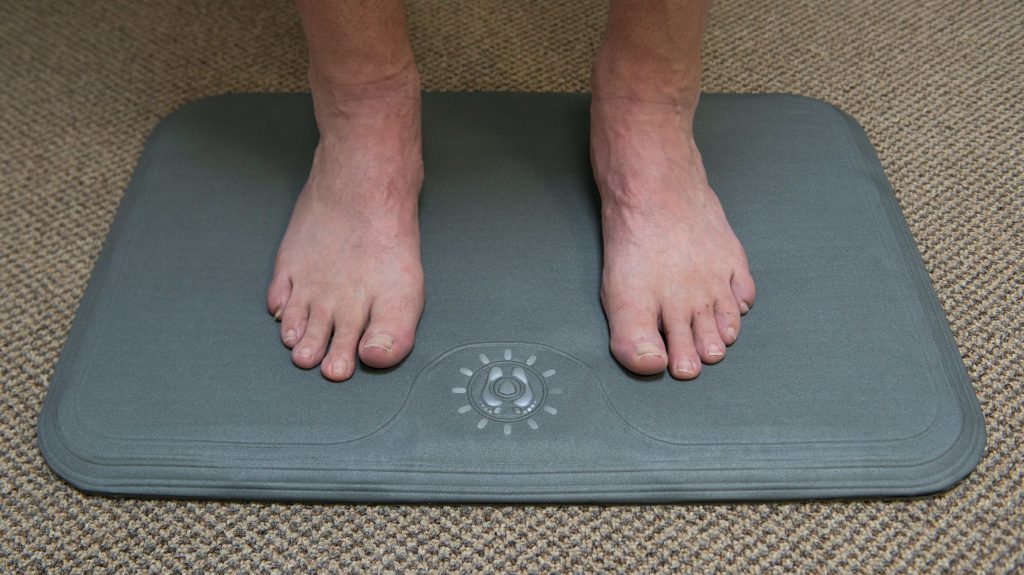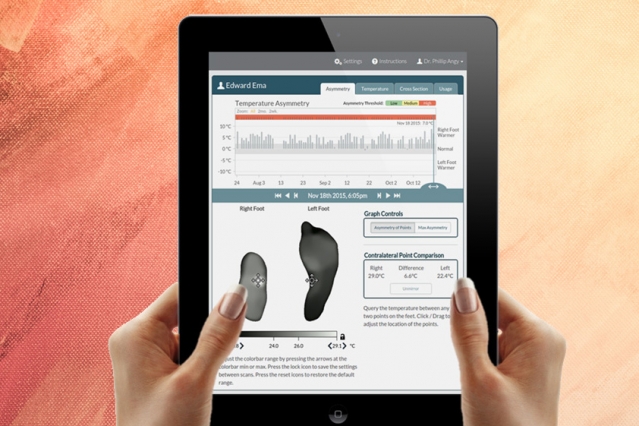Author: Martin Trust Center
by Kara Baskin
Jon Bloom, M.D., didn’t need to attend business school to jumpstart his career. Before arriving at MIT in 2011, he was director of medical affairs at Covidien, a health care products company, and an anesthesiologist at the University of Pittsburgh Medical Center. While at UPMC and an anesthesia resident at the Massachusetts General Hospital, Bloom had participated in numerous lower extremity amputations for diabetic patients whose limbs were destroyed by a diabetic foot ulcer.
At MIT, he set out to change that by deploying his medical experience in the startup world.
He now runs Podimetrics, a Somerville, Mass.-based startup that manufactures monitoring mats that help patients with diabetes prevent these devastating ulcers before they eat away at the skin. Users step onto the mat like a scale, and it pinpoints temperature differences throughout the feet. Such inflammation could indicate a formation of an ulcer. The product detects potential ulcers in 97 percent of cases, drastically reducing amputations through early intervention — and medical costs, too. As of early 2018, the mat is in more than 500 homes, with strong patient-adherence rates.
The idea took off at MIT’s Hacking Medicine event, one of the largest health hackathons worldwide. Over the course of a weekend, teams form to address pressing medical challenges. Hackathon co-founder Elliot Cohen, at the time a Trust Center Entrepreneur in Residence and now the co-founder and chief product officer for PillPack online pharmacy, recruited the first-year student to participate.
The decision was fortuitous: At the Hackathon, he was approached by classmate David Linders, who had the idea for Podimetrics. Recalling his amputation experiences, Bloom eagerly joined the team.
“It was such an interesting project to hack on. Suddenly we’re talking about foot ulcers on a random weekend, and we won Hacking Medicine,” he says.
Buoyed by the win, the group next participated in the 2011 MIT $100K Pitch Competition. They earned second place, and they also won the audience-choice award. Next, they won the life science track at the $100K Launch finale. Gradually, the concept began to feel like a valid idea.
To steer the burgeoning company into his second semester, Bloom participated in a late-night class that he fondly calls “Get Stuff Done,” with Trust Center managing director Bill Aulet. He also participated in the Beehive Cooperative, a large startup incubator under the Center’s auspices, that is now a formal accelerator program run by the Center and known as MIT delta v. In this energetic workspace, he was surrounded by likeminded entrepreneurs, brainstorming and swapping ideas. It was a switch for the anesthesiologist, who was used to working independently in life-or-death situations. Unlike the Trust Center, the operating room wasn’t a venue for brainstorming and camaraderie.
“I’d more or less sleep at the Trust Center. It was one of the most motivating experiences of my life, this ‘go, go, go’ culture there. Bill Aulet and [Trust Center Entrepreneur-in-Residence] Colin Kennedy had become heroes to me,” Bloom says. “At the Center, we were just pushing each other. Even with so much work to do, it was a fun place. It was a supportive place.”
Aulet was particularly instrumental in helping Bloom transform from seasoned physician into entrepreneurial leader, providing crucial networking opportunities for the doctor.
“I love Bill Aulet, because he’s seen everything so many times. He’s a wonderful connector — if there’s someone you need to meet, Bill can get you to that person. For my first round of funding, Bill was my reference. He’ll do anything for the student body,” Bloom says.
As Podimetrics gained momentum and funding — one MIT-organized trip to Silicon Valley helped to attract an angel investor — Bloom realized that he needed to take a leave of absence from school to focus exclusively on the company, although he still spent plenty of time at the Center. Those ties continue to bind.
“I still spend time there regularly to meet with current students,” he says.
Because, for the anesthesiologist who was so used to working alone, the Trust Center’s culture mattered as much as his classes.
“The education you get [at MIT], finance and accounting, is important. But, at the Trust Center, it’s about being around such intelligent people. It’s the life lessons. It’s learning how to create. Interacting in this team environment is life-changing. Medicine is a deeply hierarchal structure. At the Trust Center, it’s ‘we’ can do this. And that ‘I’ to ‘we’ switch was huge for me. It changed how I get things done.”




Follow